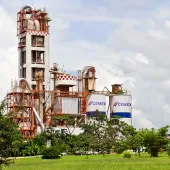CEMEX transporting even more aggregates by rail

Company hits the 2 million tonne mark earlier than ever as tonnages by rail continue to increase
CEMEX have reached the two millionth tonne of material transported by rail earlier in the year than ever before and say 2016 is on course to be their best year yet for material movement by this economically and environmentally beneficial mode of transport.
Moreover, this year is the fourth successive year in which the transportation of materials from the company’s operations – primarily its quarries – has increased.
CEMEX, working in partnership with DB Cargo UK, run approximately 40 train loads a week, mostly out of Dove Holes, in the High Peak district of Derbyshire, to 11 locations around the country.
‘The 2 million tonnes by rail is equivalent to 65,000 truck movements being taken off our congested road network,’ commented Mark Grimshaw-Smith, head of CEMEX Rail and Sea, who added that it was great to see even more material moving across the UK by rail.
Jon Clarke, account manager at DB Cargo UK, said: ‘This represents a tremendous effort from everyone involved. We are proud to be an integral part of CEMEX’s supply chain, responsible for moving these products by rail safely, efficiently and in a way that minimizes the effect on the environment.’
CEMEX operate four rail despatch points – Dove Holes Quarry, in Derbyshire; Shap Quarry, in Cumbria; and Neath and Cardiff, both in South Wales – and transport a range of different aggregate products to a total of 14 receiving depots serving key areas of the country.
For example, high-PSV Cumbrian hardstone goes to Washwood Heath, near Birmingham, for use in asphalt; limestone is transported to Birmingham for PFI work and to London for major construction projects such as Crossrail; and large lumps of limestone go to East Anglia for burning in kilns to produce lime that is used to purify the juice from sugar beet in sugar production.









